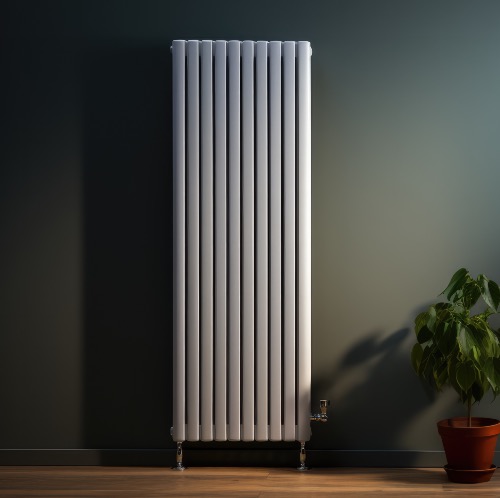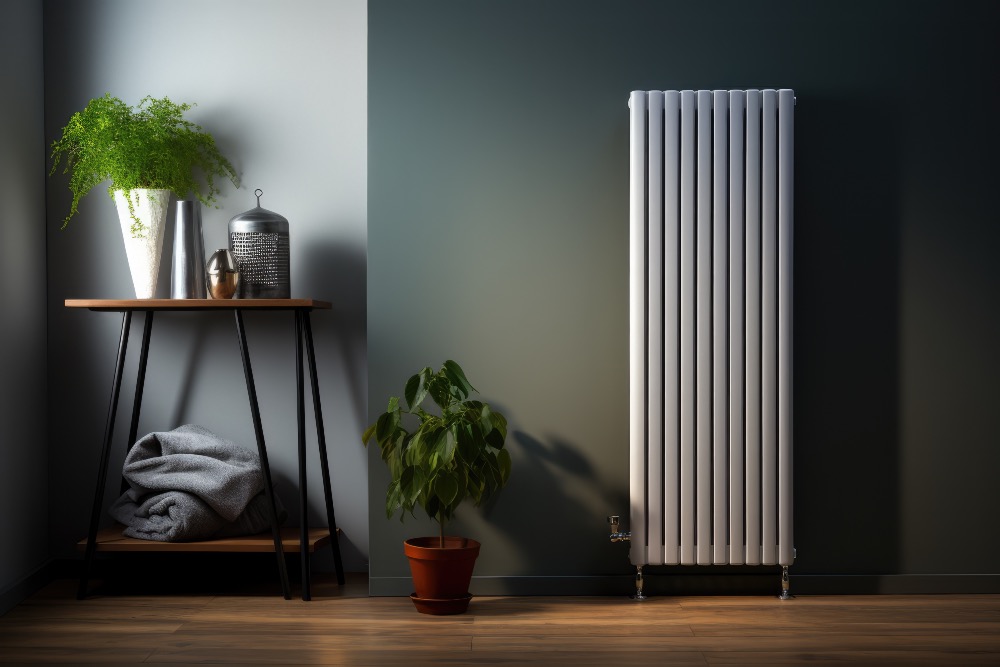Last Updated: Saturday, 10th February 2024
BTUs and Delta Ratings in Radiators Explained - The Ultimate Guide
If you've ever found yourself in the market for a new radiator, you've likely come across the term "BTU." But what is BTU, and why is it so essential when it comes to choosing the right radiator for your space? In this guide, we'll delve deep into the world of BTUs and Deltas, focusing specifically on their roles with radiators and every trap you should be looking out for.
What Does BTU Mean?
BTU stands for British Thermal Unit. It's a unit of measurement for heat energy. Specifically, one BTU is the amount of energy required to raise the temperature of one pound of water by one degree Fahrenheit. Old age stuff. But all you need to worry about is that in the case of a radiator, it is commonly used to indicate its power and efficiency.
The Importance of BTUs in Radiators
So, BTUs are the backbone of radiator efficiency and understanding them is not just a matter of technical jargon; it has real practical implications for you.
A radiator with a higher BTU will produce more heat and a radiator with a lower BTU will produce less heat. However, it's not just about going for the radiator with the highest BTU; you should be looking to have the right BTU for your space, which means matching the BTU output of a radiator with the BTU demand of your room. It's all about finding the right balance.
Calculating BTU for Radiators
If you don’t want to call a professional, calculating the BTU demand of your room is easy. There are many online calculators. But, overall it is essential work when understanding how to heat your home. Various factors like the room’s dimensions, number of windows, and type of insulation should be taken into consideration. Let's look at this in more detail:
Room Size & Ceiling Height
The size of the room you're looking to heat plays a significant role in determining the BTU demand of your room. Larger rooms will naturally require more energy to heat, so you're going to need radiators with higher BTU ratings.
Number and Size of Windows
Windows are one of the biggest sources of cold, so it makes sense that the number of windows will impact the BTU demand for your space.
Insulation
Poorly insulated rooms will lose heat more quickly, again requiring more energy to maintain a comfortable temperature and thus a radiator with a higher BTU rating.
Sunlight Exposure
Rooms that receive a lot of sunlight may require fewer BTUs to maintain a comfortable temperature, as the natural heat from the sun can contribute to warming the room.
The Consequences of Mismatched BTUs
Choosing a radiator with too many or too few BTUs can lead to a whole host of problems. A radiator with too high a BTU rating can result in your room being too hot and also unnecessarily high energy bills. On the other hand, a radiator with too low a BTU rating will mean you will struggle to heat the room adequately.
But here's the thing – it won't be just about a cold room. You could end up facing higher energy costs as your heating system works endlessly to try and bring your room to temperature. This not only affects your wallet in terms of bills but could also lead to more maintenance costs down the line. Moreover, you might find yourself investing in more heating solutions to try and fix the chill.
On the flip side, radiators that are accurately rated in terms of BTUs offer more than just comfort – they pave the way for substantial savings. Opting for a radiator that efficiently heats your room can significantly reduce energy wastage and ultimately result in cost savings across the board.
BTU and Radiator Models
There are various models of radiators available, each with its own BTU rating. From traditional to modern designs, the BTU rating is the key factor that allows you to compare different designs in terms of heat output when making your choice. The main things that will affect the BTU rating of a radiator are:
Radiator Materials: The material of the radiator affects its BTU output. Aluminium radiators are the most conductive compared to steel and iron radiators, which means they usually have a higher BTU.
Panel Radiators: Single, Double and Triple panel radiators have more surface area in that order. Essentially, the more surface area, the more heat that can be transferred into your room. Therefore the higher the BTU rating.
Height and Width: Similar to the number of panels, the bigger than radiator the more surface area, so therefore the higher the BTU rating.
Seasonal Adjustments
Your heating requirements aren't static; they change with the seasons. So factoring in these seasonal adjustments is important. You may want to opt for a radiator that is slightly bigger than the demand of your room. This way, during the colder months, you won’t have an underpowered radiator. Then, in warmer months, you can use a TRV to reduce the temperature (or BTU output) of your radiator.
Delta T (Δt) - What Does It Mean?
Delta T, often denoted as Δt, represents the temperature difference between the water circulating in your central heating system and the ambient temperature of your room. For example, if the ambient temperature in your room is 20°C, and the temperature of the water in your central heating system is 70°C, then your Δt will be 50, or otherwise written as Δt50.
Delta T = Average Temperature of Water in Radiators - Average Preferred Ambient Temperature
BTU and Δt
As we have already discussed in this post, the performance of a radiator is measured by the amount of heat it emits, which is quantified in BTU. But, it is essential to consider BTU in the context of Δt. For example, if your central heating system is designed for Δt50 and the radiator you are choosing is based on Δt60, then the heat output of your new radiator will be too low and thus, your central heating system will be inefficient.
You can calculate the BTU output between different Δt environmental using correction factors. For instance, if you have a BTU rating that's meant for Δt60 and you want to use it in an Δt50 situation, you just need to multiply it by 0.789.
To illustrate using an example: If we imagine that you've selected a radiator that perfectly meets your room's BTU requirements - let's say it's a rating of 3000 BTU - but it was calculated based on Δt60. Now, you find out that your central heating system is designed for Δt50, the radiator you chose would only produce an output of 2367 BTUs. So, we see that this radiator is not powerful enough for your room.
Example Correction Factors
If you need correction factors, the manufacturer will have accurate values for their products, however, these Δt correction factors can definitely help you:
Δt | Correction Factor | Example BTU |
65 | 1.41 | 5640 |
60 | 1.28 | 5120 |
55 | 1.13 | 4520 |
50 | 1 | 4000 |
45 | 0.87 | 3480 |
40 | 0.747 | 2988 |
35 | 0.63 | 2520 |
30 | 0.51 | 2040 |
25 | 0.41 | 1640 |
20 | 0.3 | 1200 |
If you need to correct from Δt60 to Δt50, then just inverse that correction factor. For example:
0.781 = 1 / 1.28
So the correction factor when calculating the BTU of a Δt60 radiator at Δt50 is 0.781.
Which Δt Should I Be Using?
In the not-so-distant past, the UK followed a standard that calculated a radiator's BTU based on Δt60. This was the industry norm and served as the benchmark for both manufacturers and consumers alike. However, in line with evolving technologies and a greater focus on energy efficiency, this has now changed and we now work with Δt50.
As explained in the example before, this shift in standards is really important to understand as it can have a real impact on how you select the right radiator for your room. Some manufacturers still quote BTU at the old Δt60 standard. Sometimes they even quote above that. So you can see that you may be easily misled into thinking a radiator is more powerful than it is, resulting in an inefficient heating system that doesn't meet your expectations or needs.
Therefore, it's really important to ensure that the BTU rating you're considering aligns with the current standard of Δt50. By doing so, you're taking a critical step in making an informed, accurate choice that will serve you well in both comfort and cost.
For clarity, we here at PlumbHQ always use Δt50 when advertising the BTU rating of our radiators.
Energy Efficiency and Environmental Impact
One often overlooked aspect of choosing a radiator with the correct BTU and Delta rating is its environmental impact. A radiator that is too powerful for a room will not only lead to higher energy bills but also contribute to a larger carbon footprint. On the other hand, a radiator that is too weak will have to work overtime to heat a room, which is also not energy-efficient. Therefore, selecting a radiator with the correct BTU and Delta rating is not just good for your pocket but also for the planet.
Common Mistakes and How to Avoid Them
Overestimating BTU Needs: Many people think that a higher BTU rating automatically means better performance. This can lead to overheating and higher energy bills.
Ignoring Delta Ratings: Focusing solely on BTU without considering Delta ratings can also result in inefficiency.
Not Considering Room Variables: Factors like insulation, window size, and even the number of people in the room can affect BTU needs.
Ignoring Seasonal Changes: As mentioned earlier, BTU requirements can change with the seasons. Ignoring this can lead to inefficient systems.
Tips for Making an Informed Choice
Consult Professionals: For the most accurate BTU assessment, consult with experts who can consider all the variables, including room size, insulation, and more.
Check Delta Ratings: Always check the Δt rating for UK radiators to ensure you're comparing like for like and not buying a radiator that looks more powerful than it is. Δt50 is the preferred rating.
Consider Long-term Efficiency: A radiator with a slightly higher BTU than required offers some leeway for colder days, allowing you to turn it down when not needed.
BTU in the Context of Heat Pumps
Heat pumps operate at a lower flow temperature than traditional gas boilers. This lower flow temperature means that you would need a radiator with a higher BTU to heat the room effectively. So, if you're considering replacing your existing boiler with a heat pump, you'll need to check your radiators are still suitable.
Final Thoughts
Understanding BTUs is not just a technical exercise; it has real-world implications that affect your comfort, energy bills, and even your carbon footprint. Whether you're looking to heat a small room or a large commercial space, the BTU rating of a radiator will be a key factor in your choice. By taking the time to understand what BTU is and how it's measured, you can make an informed decision that will serve you well in both the short and long term.
Any more questions?
If you have any queries or questions about the products we sell, or even your next project, give us a shout! We'll try our best to give you a hand.

